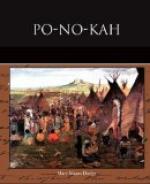Soon Kitty, who could run no more, was snatched angrily from the ground and carried, like a bundle, under the great muscular arm of one of the savages. But when Rudolph showed evident signs of exhaustion, the Indians paused, evidently consulting together whether they should not tomahawk the children at once. Tom could stand it no longer. He declared that he would not go another step if the children were injured a hair.
“Let me carry them,” he cried. “I am strong enough to bear a dozen youngsters—unbind me, I say, and hand ’em over.”
Some of the red men knew enough of English to understand his meaning. With a contemptuous sneer one of them tossed Rudolph on Tom’s back; then set one of his arms free, and drove him onward with many a brutal stroke. It was hard work for Tom, shackled as he was, to bear the frightened boy, who at times clung to his throat so tightly as to almost strangle him.
“Hold on, Rudolph, boy,” he whispered; “lower down—there, that way. Now don’t cry; you’re father’s little man, you know.”
“Oh, Tom,” sobbed the poor boy, “they’ll kill us, I’m sure, as they killed little Annie Green. See, now, how they carry Kitty—how they scrape her face against the bushes; oh! oh!” and Rudolph hid his eyes in Tom’s hair, crying as if his little heart would break.
“Hush!” muttered Tom, sternly, “or I’ll put you down.”
In an instant one of the red men whose look, though grim and fearful enough, showed less savageness than his companions, gruffly took Kitty from the Indian who was carrying her with such cruel carelessness. The change comforted the child, and in a few moments the exhausted little creature was sleeping soundly upon his shoulder, never waking even through the thunder-storm that ere long seemed to rend the forest.
In this way the Indians hurried on, pausing once to change their captive’s bands, so as to leave his right arm free instead of his left. Now and then Tom would put Rudolph upon the ground for awhile, and when the little fellow flagged he would lift him up to his shoulder again.
At nightfall the party halted and made a large fire of brush, by which they cooked some venison and hominy, which had been carried by them during the march. After partaking of their meal, and giving their prisoners a liberal supply, they disposed themselves for the night, first taking care to fasten Tom’s hands and feet securely, and even to bandage the children’s ankles so that they could not stand. In vain Tom peered about him for a chance of escape for himself and his charges—for he would on no account have left them behind—but there was no hope. His knife had been taken away from him, and all night long he was watched by two Indians, who remained near him in a sitting posture. Even when their dusky faces were lost in the darkness, he could see the gleam of their piercing eyes as the fire-light flashed and faded. Once, when the pain from his fastenings




